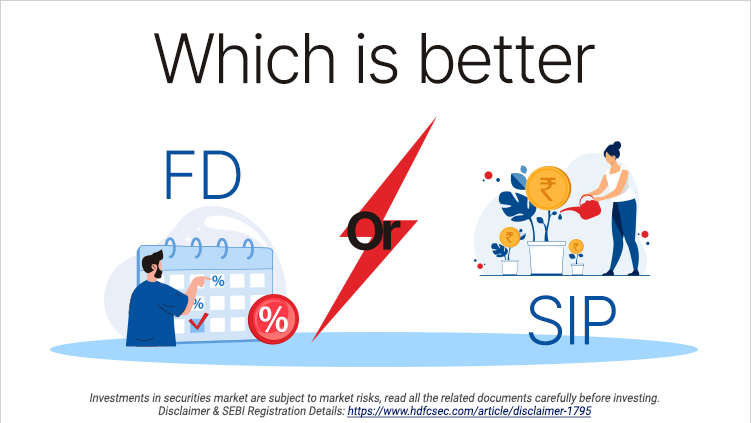Which is Better FD or SIP
A bank’s Fixed Deposit (FD) is a popular investment option amongst Indians. It is often preferred by common households as a low-risk investment that can help them in future. Among various other investment options available, investing in mutual funds is gaining traction. Mutual funds investment through a Systematic Investment Plan (SIP) is a relatively new avenue. How do you decide which on to add to your portfolio? Continue reading to learn more about the difference between SIP and FD to make an informed decision.
What is a Fixed Deposit?
A Fixed Deposit is a type of investment wherein you can park a specific amount in an account with a bank or deposit-taking non-banking financial corporation (NBFC) for a pre-decided tenure at a predetermined interest rate. You can opt to receive the interest payout on a regular basis or to have them compounded each year.
What is SIP?
SIP refers to a Systematic Investment Plan and enables investors to easily invest in mutual funds. It entails you paying a fixed sum at pre-defined intervals towards a mutual funds scheme. You can choose the interval at which you want to invest and avoid the hassle of paying a lump sum amount.
What is the Difference between an FD and SIP?
- Suitable For:
Ideally, a Fixed Deposit is more suitable for those who tend to hedge their bets and make conservative choices. On the other hand, SIPs are versatile and work well for both aggressive as well as conservative investors.
- Investment:
When you opt for an FD, you have to deposit a lump sum amount, to begin with. While you can opt for one which requires a smaller principal investment, it is still a one-shot deposit. On the other hand, with SIP, you can invest a small amount, as little as Rs 500 periodically. You can also change the amount and get the option of auto-debits which offers convenience.
- Liquidity:
A fixed deposit account in a bank is opened for a pre-determined period. Hence, the money in the account is locked in till the maturity period. Moreover, banks and other financial institutions can also levy certain charges on premature withdrawal or closure of FDs.
- Risk:
Fixed deposits are low-risk investments. They offer regular interest payout at a fixed rate. On the other hand, SIP is a way of investing in the market. Thus, the risk attached increases.
- Returns:
With an FD, you can rest assured that you will be receiving returns in the form of regular interest payouts at a fixed rate. However, the returns on SIP depend upon the market movements. When the financial markets perform well, your SIP can deliver higher returns.
Overall, whether you choose SIP or FD, both investment options have their pros and cons. While an FD is a safer bet, you might have to manage higher risks with SIP, but also stand a chance to earn higher rewards. At the end of the day, you must consider the argument concerning FD vs SIP and make a decision based on your financial goals, risk appetite and thorough research.
Related Posts
Don't miss another Article
Subscribe to our blog for free and get regular updates right into your inbox.
Categories
newsletter
 HSL Mobile App
HSL Mobile App 



